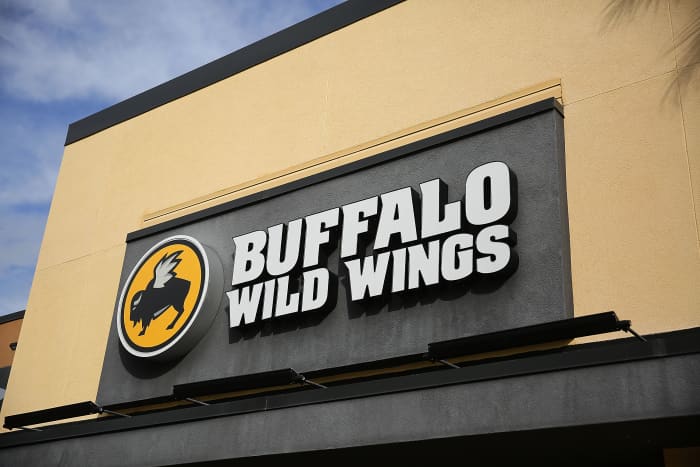The ever-popular chicken wing — also America’s go-to dish on Super Bowl Sunday — is apparently having an identity crisis.
The classic finger food has long been a restaurant staple, often featured on the appetizer side of menus. But over the years, it has increasingly morphed into a main dish. Think of the many wing-centric chains, such as Buffalo Wild Wings and Wingstop
WING,
that put the fowl favorite front and center.
And think of the fact that many Americans will simply devour wings as an entrée regardless of how they’re classified on a bill of fare.
That was the case when the popular chain Chili’s added wings to its menu last year in advance of football season — and the result was that customers spent less (or traded down) by making wings their meal instead of ordering them as a starter, according to recent comments from Kevin Hochman, CEO of Brinker International
EAT,
the parent company of Chili’s. The chain has continued to offer wings, but no longer displays the item as prominently on its menu in an effort to reverse the trend.
“We course corrected,” a Brinker spokesperson told MarketWatch.
The issue continues to bedevil many other restaurants, according to industry analysts and professionals. The bottom line is no one quite knows what a plate of wings constitutes anymore — appetizer, entrée or something entirely of its own classification.
Ironically, if there’s one day on the calendar when such distinctions seem meaningless, it’s Super Bowl Sunday. That’s when an incredible number of wings are devoured — 1.45 billion wings are expected to be eaten, according to a pre-game estimate from the National Chicken Council — and there’s not much thought given as to where the item sits on the dining spectrum. It’s just, well, game-day food.
But during the rest of the year, confusion often reigns.
There are those who insist wings are entrée-worthy and can’t take a back seat to any other food when it comes to mealtime.
“They’re the raison d’être,” said Arthur Bovino, a food writer and podcaster who knows wings from his considerable time spent in Buffalo, the city most associated with the dish.
“‘They’re the raison d’être’”
Others say a few wings go a long way — and they’re fine with keeping them in the starter category.
“I don’t like to eat an entire thing of wings,” said Kristi Marquez, vice president of marketing for Das Beer Garden, a sports-minded restaurant in Jupiter, Fla., that naturally features the dish.
Marquez added that her establishment has a grazing-style approach to dining — meaning there’s less distinction between starters and main dishes and customers generally order a few things — so the wing conundrum is not a big issue.
Other restaurateurs say even if customers order the wing appetizer as a meal, they don’t want to stand in anyone’s way.
“My goal is for people to eat what’s on their plate. If they feel like having an appetizer as an entrée, I encourage it,” said Ron Silver, chef and owner of Bubby’s, a popular New York City restaurant that offers a smoked-style gourmet take on wings.
Arlene Spiegel, a New York-based restaurant consultant, added that establishments are also well aware that wings — often a fairly spicy item in that Buffalo-style preparation — set the stage for customers to order more drinks. And that’s where money is particulary made in the restaurant business.
“The real margins are in the booze,” she said.
The connection between wings and alcohol speaks to the very beginnings of the wing craze in America decades ago. That is, the dish was neither an appetizer nor an entrée, but simply a low-cost bar food. Or what Clark Wolf, another industry consultant, called “20th-century peanuts,” a reference to a historic bar item offered gratis to make patrons thirsty.
A server at an Anchor Bar brings out some wings. The wing-centric establishment started out in Buffalo, but now has several franchised locations.
Anchor Bar
Specifically, the creation of the Buffalo-style version of wings that became so popular is often credited to the Anchor Bar, a Buffalo, N.Y., establishment, that began serving the dish in the ‘60s. While there’s some debate as to whether others in Buffalo came first, the point is that wings and boozy beverages were inextricably tied together.
Eventually, wings went beyond the bar and became featured at restaurants, especially as a shareable appetizer. To this day, they’re the third most-featured appetizer on menus behind salad and soup, according to Datassential, a company that analyzes restaurant trends.
But how and why did wings cross the line into meal territory?
Some industry insiders and observers say it has much to do with the advent of those wing-centric restaurants — Buffalo Wild Wings, a leader in the category, has been around since 1982. In effect, once some dining establishments made wings their focus, it signaled that wings were no longer a mere sideshow to the eating experience and could stand on their own in any restaurant or even when prepared at home.
“It’s changed the perception of how people eat wings,” said Chandler Steele, a senior manager of innovation for Tyson Foods
TSN,
a dominant company in the poultry business that supplies restaurants with wings and also packages wings as a supermarket product.

The Buffalo Wild Wings chain got its start in 1982.
Getty Images
Other recent factors come into play when looking at how wings have moved into the entrée realm, say experts. Perhaps the most significant they cite is the rising cost of eating out in this inflationary-prone era, as evidenced by U.S. government data that says restaurant (or “food away from home”) prices increased by 7.1% in 2023.
Wings are inevitably a cheaper meal than many other menu options. At a Chili’s in suburban New York City’s, a plate of a dozen wings with fries runs $18.89, according to the chain’s website. By contrast, a full order of the chain’s popular baby-back ribs with fries and mac ‘n’ cheese costs $25.59.
And don’t forget a certain generational factor, as in young diners don’t always follow the “rules” when it comes to what qualifies as an entrée. Or so says Claire Conaghan, associate director of publications for Datassential.
“Whatever they most want, they will build a meal around it,” she said.
Given that restaurants see fatter check averages, what could happen over time to the state of wings? Industry pros say to expect any number of possibilities.
“‘Do they have high return? Not necessarily. Do they have high risk? Absolutely.’”
Restaurants could package wings with other low-cost items — like the aforementioned example of the Chili’s combo with fries — to at least up the price tag by a few bucks and boost margins. Or they could offer wings in smaller quantities, as a way of fully signaling their appetizer status.
Another scenario: They might just de-emphasize wings altogether, especially given it’s an item subject to lots of supplier price fluctuations — there’s inevitably a spike around Super Bowl time due to supply and demand, experts note — and so margins aren’t always great.
“Do they have high return? Not necessarily. Do they have high risk? Absolutely,” said Russ Spencer, a senior director at Craftable, a tech company that services restaurants.
And yet, America’s hunger for chicken wings on Super Bowl day or any day is such that no one really expects the menu item to disappear anytime soon. If anything, there are probably more diners out there ready to feast on a sizable serving of them.
Certainly, that’s how David Thomas, a 48-year-old wing fan who lives in suburban Chicago, feels about the fowl favorite. He’s fine with having a wing or two as a happy-hour snack. But when it comes to true wing eating, he needs a plate of about 10.
“They’re 100% a meal,” he said.




















Discussion about this post